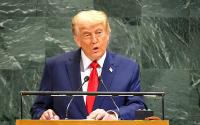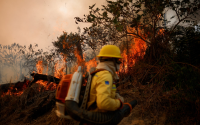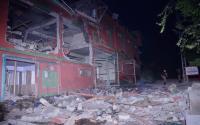Common Dreams / Published on Thursday, March 23, 2006 by Agence France Presse
The Iraq war is now as unpopular at home as the Vietnam war was in 1968, but in the absence of a military draft and a clear way out, Americans are not taking to the streets, analysts say.
 RURAL WEST VIRGINIAProtesters march past the Wood County Courthouse, Parkersburg, WV on Sunday, March 19, 2006 in a march to protest the Iraq war. The event was scheduled to mark the third anniversary of the beginning of the war. (Parkersburg Sentinel Photo/Dave Payne Sr.) RURAL WEST VIRGINIAProtesters march past the Wood County Courthouse, Parkersburg, WV on Sunday, March 19, 2006 in a march to protest the Iraq war. The event was scheduled to mark the third anniversary of the beginning of the war. (Parkersburg Sentinel Photo/Dave Payne Sr.) |
Compared to Vietnam, the Iraq war is remarkable for how quickly it lost public support, said John Mueller, a political scientist at Ohio State University.
"With 2,000 dead in this war, support has dropped to the point that it took 20,000 dead in Vietnam," at the time of the Tet offensive in 1968, he told AFP.
But if Americans are not marching in the streets to voice their discontent, it is largely because the alternative to war is not clear — and because, in the absence of a military draft, they are simply not that affected by the conflict.
"This war, as bad as it is, touches a far smaller percentage of the population than Vietnam did," said Charles Franklin, a political science professor at the University of Wisconsin in Madison.
"You do see peace rallies on the Madison campus, but you don't see anything like the anti-Vietnam rallies and riots that you had here back in the '60s," he said.
"Not one of our students is being drafted into the military. Not many are volunteering," he noted.
"That does dramatically reduce the self-interest that people have in opposing the war, and it leaves you with core peace activists ... they are a smaller group than certainly you saw in the 60s," he said.
Peace activists, meanwhile, insist the anti-war movement is growing.
Brian Becker of anti-war coalition ANSWER said the group decided to focus on "neighborhood-based protests" instead of mass mobilizations on the third anniversary of the war.
At a rally in the working class Bronx neighborhood of New York, 500 people marched through a busy commercial area and got "huge support," he said.
"Everyone was waving, honking their horns and taking literature," he said. "These are people who don't have the resources to get on a bus and come to Washington."
Peace activists say their meetings are drawing new faces, and protest opponents have all but vanished.
A crowd of about 115 met in rural Parkersburg, West Virginia — near the home of war hero Jessica Lynch — for an anti-war rally Sunday. They came to hear an Iraq war veteran and the mother of a wounded soldier.
For this area it was "a pretty big turnout," said Walt Auvil of the Wood County Democrats. The county has lost three soldiers in Iraq, he said.
When the war started "people were very trusting and believing of President Bush. That has eroded very significantly," Auvil added.
Another public opinion snapshot will come with an April 4 bring-the-troops-home referendum being held in 32 municipalities in the midwestern state of Wisconsin.
Organizers say a signature-gathering campaign in politically diverse parts of Wisconsin put the issue on the ballot, but they have "no idea" about the outcome.
"We don't have money for a big media campaign to influence public opinion, so I think what we're going to see is basically public opinion in its raw form," said Steve Burns of the Wisconsin Network for Peace and Justice. A recent poll suggests that whatever their feelings about the war, Americans have done little more about it than pray.






